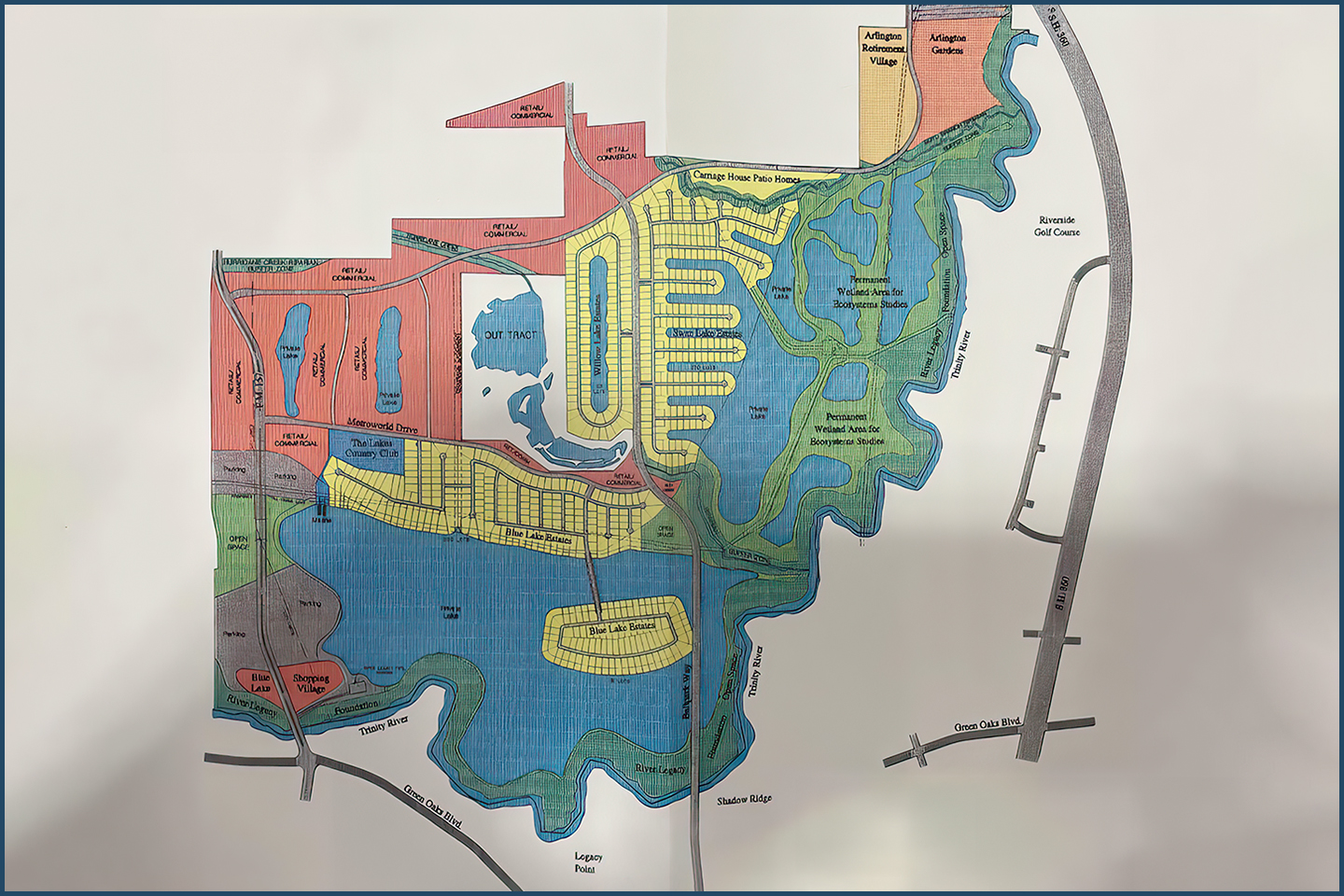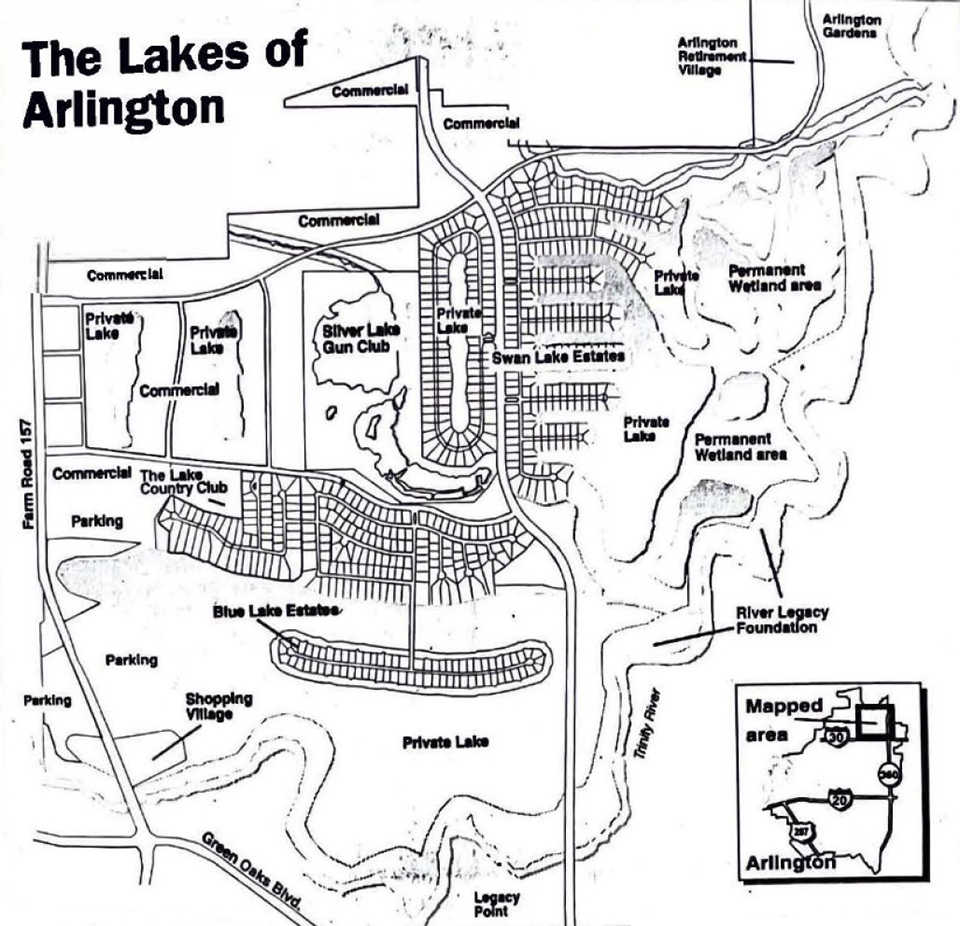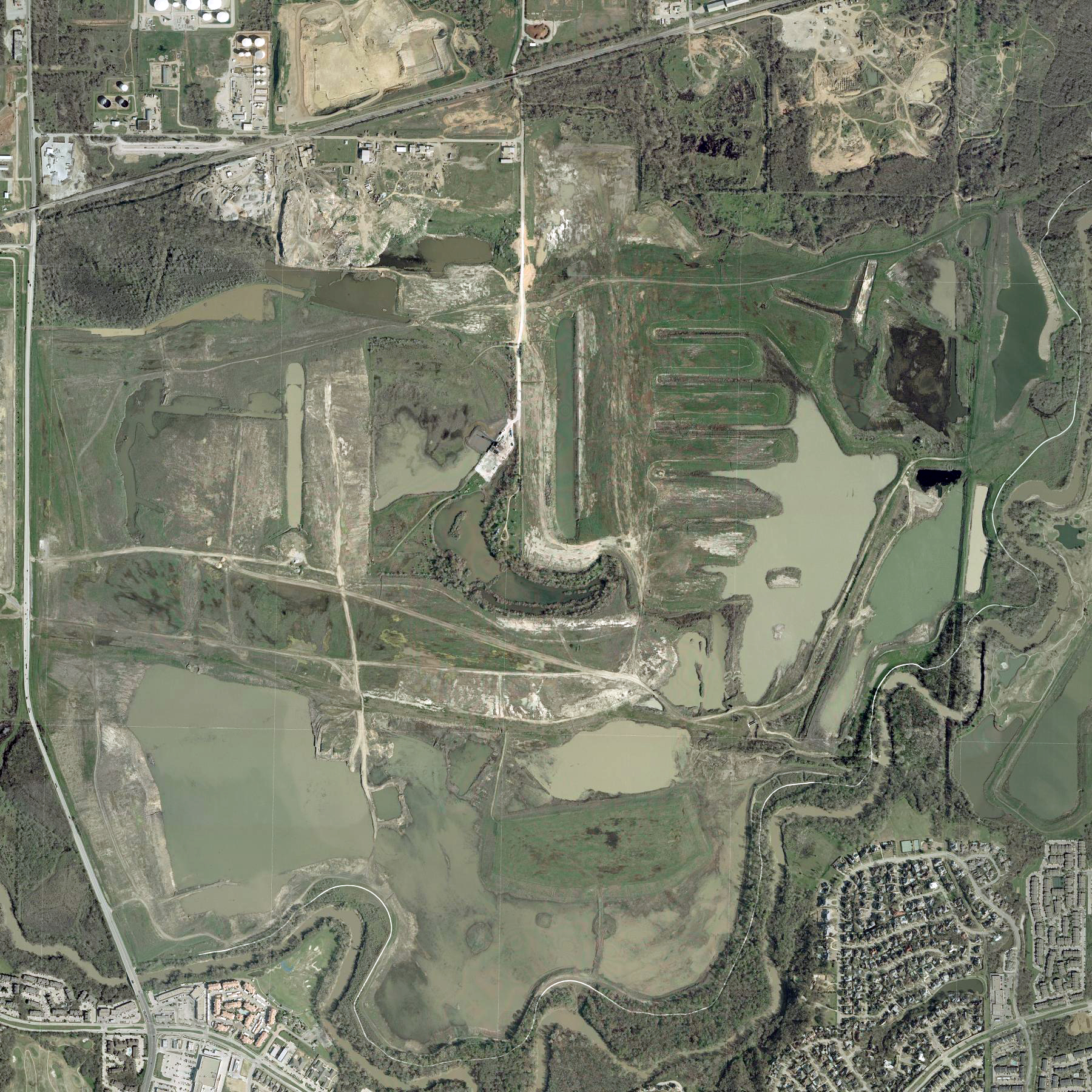Historical Site Getting High-Dollar Face-Lift
Fort Worth Star-Telegram, May 13, 1996

The Lakes project would be built on Trinity flood plain
By JEANNE GRAHAM
ARLINGTON - For more than 150 years, a 2,000-acre parcel of land in the Trinity River flood plain near the center of the Metroplex has been an ill-fated address.
The area's first Anglo settlers abandoned it as an inhospitable site in 1842. Even the five who died trying to make a go of Bird's Fort were not allowed a peaceful rest. Their burial site, considered the first in Tarrant County, was mistakenly destroyed by a gravel mining operation in the 1960s.
Over the years, the bulk of the land has been mined intermittently for its sand and gravel, but never developed nor incorporated. A small leased portion—111 acres—has been a private gun club since 1939.
In the 1980s, investors who wanted to transform the tract into a mixed-use complex went bankrupt and the property was auctioned off by the federal government.
Today, its current owners, Metrovest Partners Lid., believe they can buck historical precedent.
Jim Salim, a representative of Metrovest, said he believes the site, near three major freeways and within minutes of Dallas/Fort Worth Airport, will become the premier address in the area.
"This is just the most phenomenal piece of property I've seen in my life," Salim said during a recent tour of the property.

Metrovest is moving 25,000 cubic yards of dirt a day to build The Lakes of Arlington, a community of 644 high-end homes within three gated neighborhoods. The project calls for three private lakes, a country club, botanical gardens and permanent wetlands area.
Salim said the minimum price on home lots will be $150,000, with home prices beginning at $500,000. A retirement village, shopping center and other retail and office buildings are also envisioned, he said. And homes on the lakes or canals will have price tags of $1 million and above, he said.
Rose Jacobson, the city of Arlington planning director, will update a City Council committee tomorrow on the latest discussions with Salim, who has said he will seek annexation.
If the area were annexed, the city would control land use and building standards, and the developer would receive city services such as police, fire and water, Jacobson said.
The costs and benefits lo the city of annexing the Metrovest property, which lies east of Farm Road 157 and north of the Trinity River, will be analyzed after Salim formally applies for annexation, city officials said.
And a bond election might be required to fund streets and sewer lines. But any expenditures, city officials said, will occur only as the development itself is built.
Salim said he believes that The Lakes project will be easy to market. People in the real estate industry and city officials agree, saying Arlington is short on luxury housing.
"Part of the reason a lot of people are excited about this, is that instead of having people go to Colleyville or Southlake for that kind of housing, they can come to Arlington," Mayor Richard Greene said. "I think it's terrific."
Developer Vicki Weinberg said The Lakes project is feasible because consumers in the half-million dollar price range want security and environmental aesthetics.
"And they are willing to pay for it, whatever it costs to do it," Weinberg said.
Weinberg, the daughter of the late Herman Smith and formerly a vice president with Herman Smith Co., said she has developed about 500 lots in Colleyville during the last decade. She also said the aesthetics associated with lakes and canal systems have helped sell Colleyville projects. The Lakes at Somerset, a 100-lot subdivision with $100,000 lot prices which Weinberg developed about five years ago, sold out in less than two years, she said.
Jim Whitten of CB Commercial said easy access to the airport and Interstate 30 make the location "a hot market." Whitten said there is a strong demand for high-end housing in north Arlington. He and others in real estate predicted success for the project—unlike predictions made about Metrovest's previous plans.
Salim's first dream for the property had been a sprawling, multimillion dollar entertainment complex with resort hotels, restaurants and botanical gardens. Two months ago, the company abandoned those plans when consultants indicated it would take $150 million more than the $80 million planned for start-up.
Now dozens of huge yellow machines are moving 25,000 cubic yards of dirt a day, Salim said, cutting and filling for the lakes and future buildings.
Salim donated 1 million cubic yards of dirt to the city of Arlington to use as liner in its landfill. In exchange, the city is digging and hauling the dirt—300,000 cubic yards since February, city officials said Friday.
And gravel excavations at the site are generating about $200,000 a month, Salim said.
Nearby homeowners are worried about flooding that might be caused by future construction.
"It bothers me anytime something is in the flood plain," said David Thomas, who lives at 609 Chaffee Drive. "And the river has backed up into our neighborhood before."
Flooding issues were evaluated before Metrovest received a development permit from the Army Corps of Engineers, said corps officials. The latest development plan, The Lakes project, will be reviewed by corps personnel to guarantee that Metrovest meets the requirements of the permit despite changes to the plan, officials said.
The last attempt to develop the acreage was in the mid 1980s, when developers and speculators were buying land at inflated prices. The prices dropped in the late 1980s—due to the collapse of the Texas energy market and the 1986 tax revisions which eliminated some of the tax benefits of real estate ownership—and many Texas financial institutions folded.
In 1984, the expanse that was to become "The Lakes" property was part of the real estate frenzy.
Meridian Savings and Loan first assembled it into one 2,000-plus acre parcel which Meridian planned to market as an industrial business park. The development was called "Riverside," and a $50 million levee system was planned to help bring the land out of the flood plain. By 1987, Meridian had a permit from the Corps of Engineers to begin the project.
Former Arlington Mayor S. J. Stovall, who headed Meridian's development efforts and now works for Salim as a consultant to The Lakes project, spent three years working on Riverside. But in 1988, as construction was about to start, Meridian experienced financial problems, Stovall said.
"The company developed the plans for the reclamation but did not have the money to go ahead and build the levee and finish the project," Stovall said.
"That was the problem with many financial institutions." Stovall said. "They owned development corporations, and undeveloped property can be a drain on your resources."
Meridian folded in 1989 and was placed in receivership. In 1990, Sunbelt Savings, which held a $100 million note on the property, foreclosed. Then Sunbelt folded.
After that, the land lay dormant until Metrovest began buying it piece by piece for rock bottom prices in 1992 and 1993, eventually acquiring more than 2,000 acres for about $3.5 million, Salim has said.
"People couldn't see it as anything but a flood plain," he said. "I just kept being drawn back to it because of its strategic location."
Salim said he plans to dedicate a 200-plus acre greenbelt along the Trinity River which the River Legacy Parks Foundation wants to use for a hike and bike trail. Parks officials said Friday that arrangements between Salim and the city are nearly complete.
And in August, the Texas Highway Commission reviews highway projects statewide to determine which will be funded. The widening and raising of Farm Road 157 has had a priority two ranking for the past year, highway officials said. City officials said they are hoping that Salim's development along the two-lane highway running from Green Oaks Boulevard to Texas 10 will help obtain a higher ranking this summer and possible construction by 2000.
The proposed development, increased traffic along the highway and Salim's willingness to dedicate the right of way along his property may contribute to a higher ranking, highway officials said.
Salim, meanwhile, said the development will continue.
"It is a challenge," he said. "Our vision is the right vision. The financial rewards are potentially limitless."


